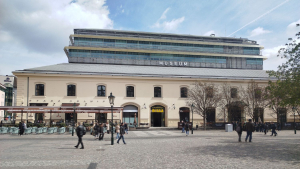
In the upcoming years, administrative institutions and state-owned companies in Poland will actively influence the evolution of the national office market—not only through leasing office space. The State Treasury will play a significant role as a key player in the investment sphere by modernizing, acquiring, selling, and constructing office properties for its own needs. In the upcoming years, administrative institutions and state-owned companies will actively influence the evolution of the national office market - not only through leasing office space. The State Treasury will play a significant role as a key player in the investment sphere by modernizing, acquiring, selling, and constructing office properties for its own needs, claims Watler Herz.
This increased activity by state entities will significantly impact the sector's development, shaping decisions regarding new projects, particularly in Warsaw. The capital city is already experiencing a supply gap. The involvement of public entities offers investors the potential to capitalize on available resources and serves as a catalyst for initiating new projects. In Warsaw, developments like Drucianka Campus, Fort 7, and additional phases of The Park Warsaw are awaiting implementation.
"Polish office market demonstrates high absorption capacity, with the public sector’s need for office space significantly driving recent growth. Demand remains near pre-pandemic record levels, bolstered by employers' emphasis on a return to on-site work. This year, we expect further growth in lease transactions, including large-scale leases by government units and state-owned companies", says Emilia Legierska, Transaction Director at Walter Herz.
While regional markets have ample supply, there is a lack of large office spaces in modern buildings in central Warsaw. This has led to an increase in pre-lease agreements as part of the total lease volume in the second half of 2024 in Warsaw.
The selection of spaces under construction remains limited. New office investments have completely halted in regional markets, while in Warsaw, only a few projects, such as The Bridge, Studio II, Office House, Skyliner II, UpperOne, Warta Tower, and Vena, are under development.
Strategic investment decisions in the public sector
State entities are currently showing heightened activity in the sector. A noticeable trend involves public entities consolidating and modernizing administrative spaces.
For instance, the Greater Poland Regional Office of the National Health Fund (NFZ) relocated to a modern office building on Baraniaka Street in Poznań last year. NFZ also modernized its building at 8 Chałubińskiego Steet in Warsaw. The state-owned Bank Gospodarstwa Krajowego (BGK) extended its lease in an exclusive office building within the Varso Place complex in Warsaw.
Polish State Railways (PKP), in collaboration with HB Reavis, developed the area around Warsaw West Station. Now, PKP’s Xcity Investment and Ghelamco are beginning a new project near Warsaw Gdańsk Station. Releasing PKP-owned land for business purposes will improve supply in Warsaw’s market, with a 2.4-hectare area near the station set to become a new business hub for the city.
Bank Pekao S.A. has put its headquarters at 53/57 Grzybowska Street in Warsaw, up for sale after over 30 years. Meanwhile, the Institute of Environmental Protection (State Research Institute) decided to sell its office-laboratory building at 5/11D Krucza Street.
Polish Transmission System Operator (PSE) has undertaken the construction of a new headquarters in Radom, with two buildings totalling approximately 158 thousand sq m to be operational early this year.
State Insurance Company PZU is also managing its assets efficiently, moving into Skanska's Generation Park Y building in Warsaw and planning the redevelopment of its old headquarters. The PZU Tower skyscraper at the intersection of Grzybowska Street and Jana Pawła II Avenue is likely to be demolished, with a 150-meter tower planned to replace it.
IMMO Park Warszawa, part of Mota-Engil Central Europe, has built a four-storey underground parking facility with 420 spaces in Warsaw and is carrying out the first stage of revitalizing Warsaw Uprising Square. The company previously developed parking projects in Wrocław, Gdańsk, and Łódź under public-private partnerships.
Polish capital with a growing share in investments
Domestic capital reached unprecedented levels of activity in 2024, accounting for about 10-15 per cent of investment transactions in the first half of the year. The recorded value was twice as high as in the previous year, while until 2022, the average share of Polish investors in the total transaction volume did not exceed 2 per cent.
"In 2024, we saw a significant revival of investment activity on Poland's commercial real estate market, with exponential growth in interest in the office sector. Estimated transaction volumes in the office sector last year reached €1.6 billion, nearly four times the amount recorded in the previous year", says Katarzyna Tencza, Transaction Director at Walter Herz.
Domestic capital played a pivotal role, particularly in regional cities, where interest in well-located and modernized properties increased. Further large transactions in the office sector are expected this year, including outside Warsaw, where there is a significant selection of attractive, modern properties.
Expected interest rate cuts will result in more attractive returns for investors. The European Central Bank’s rate reductions last year spurred interest in prime office properties. In Warsaw, the sale of the Warsaw Unit building for €280 million was completed, marking the largest office transaction not only in Poland but also in Europe. In Poznań, Nowy Rynek E office building also changed hands.



